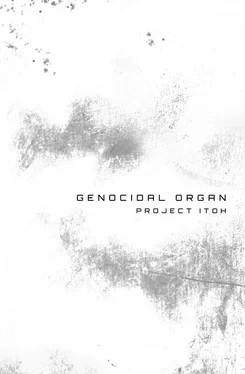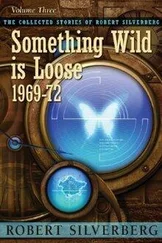Project Itoh - Genocidal Organ
Здесь есть возможность читать онлайн «Project Itoh - Genocidal Organ» весь текст электронной книги совершенно бесплатно (целиком полную версию без сокращений). В некоторых случаях можно слушать аудио, скачать через торрент в формате fb2 и присутствует краткое содержание. Год выпуска: 2012, ISBN: 2012, Издательство: Haikasoru/VIZ Media, Жанр: Старинная литература, на английском языке. Описание произведения, (предисловие) а так же отзывы посетителей доступны на портале библиотеки ЛибКат.
- Название:Genocidal Organ
- Автор:
- Издательство:Haikasoru/VIZ Media
- Жанр:
- Год:2012
- ISBN:9781421550886
- Рейтинг книги:4 / 5. Голосов: 1
-
Избранное:Добавить в избранное
- Отзывы:
-
Ваша оценка:
- 80
- 1
- 2
- 3
- 4
- 5
Genocidal Organ: краткое содержание, описание и аннотация
Предлагаем к чтению аннотацию, описание, краткое содержание или предисловие (зависит от того, что написал сам автор книги «Genocidal Organ»). Если вы не нашли необходимую информацию о книге — напишите в комментариях, мы постараемся отыскать её.
Genocidal Organ — читать онлайн бесплатно полную книгу (весь текст) целиком
Ниже представлен текст книги, разбитый по страницам. Система сохранения места последней прочитанной страницы, позволяет с удобством читать онлайн бесплатно книгу «Genocidal Organ», без необходимости каждый раз заново искать на чём Вы остановились. Поставьте закладку, и сможете в любой момент перейти на страницу, на которой закончили чтение.
Интервал:
Закладка:
Ironically though, the further the field of human neuroscience was explored, the fewer resources there were available for research into artificial intelligence, which as a discipline had become pauperized. Once scientists had established that strong AI—computers that could replicate the more complex functions of the brain—and relative redundancy in particular were not on the horizon, interest in the field of AI for military purposes had waned. There were still simply too many roles on the battlefield that could only be carried out by humans.
Given the ever-escalating cost of training and maintaining soldiers to full combat effectiveness, governments were understandably loath to lose their prime military workforce to the civilian companies that sought to hire us away, so they began taking measures to prevent a general hemorrhage. One by one, countries enacted “gardening leave” legislation preventing discharged soldiers from joining PMCs before a fixed period of time had passed since their retirement. This, in turn, made it harder for the PMCs to cherry-pick candidates speculatively, so the stock of well-qualified mercenaries had soared.
As a result, no matter where you were in the developed world, a trained soldier was not something that you could afford to have break down on you. Maintenance became a top priority. America had already had some experience of mental health care for its troops, stretching back to the previous century. Veterans of the Vietnam War and the Gulf Wars would return home and be troubled by recurring nightmares. Post-traumatic stress disorder began to eat away at the heart of America’s military, and something needed to be done about it. A cure was needed.
What I was receiving now, though, wasn’t the cure. It was the vaccine.
The goal of my counseling was to make it easier for me to kill.
“Essentially this is no different from an inoculation, Mr. Shepherd. We want you to be able to use your skills on the battlefield to your heart’s content, so to speak. At the same time, it’s important that we reduce your risk of psychological damage to the absolute minimum. When we send you to a country where you are at risk of the effects of infectious diseases, we’re always sure to give you a battery of shots, right? Well, think of the counseling we give you as a vaccine against the effects of war. Now, I understand completely that you might feel you’ve already built up a natural immunity, but just think of this as a sort of booster, a purely precautionary measure.”
I realized just then that this counselor had misunderstood, or rather misread, me. He was thinking that I was like my obstinate teammates who liked to make fun of the whole counseling process.
No. I wasn’t a macho poseur like them. I was fully aware how fragile I was as a person, given the situation I was going into. I had to shoot and people had to die. If I hesitated, I would die. But could I truly take responsibility for the enemy I killed so that I might live? Was my essence of self strong enough for me to accept that burden and carry it on my shoulders?
I realized that I wasn’t trying to evade responsibility for my sins. Rather, I was terrified that I wasn’t worthy to bear those sins. That the sins themselves were nothing more than fictions, figments of my imagination.
In the heat of battle, when the specter of death loomed large, I was paradoxically most aware of being alive. I felt my own life force vigorously pulsing against the backdrop of the death all around me. Sure, look down on me and call me a thrill seeker or an adrenaline junkie if you like. But the fact was that I killed other people so that my own life span could be extended. If I needed to step over others in order to prioritize my own existence, then so be it. It was this sensation that made me go back to the battlefield again and again for more.
But what if this killing force inside me was not truly mine? Not my own free will, but rather something engineered by a combination of these Viennese School counselors and chemical substances? I was still alive, here and now, but should I be celebrating that fact in the same way? Was that life-affirming sensation a manufactured lie?
I realized that this counseling was a real threat to my raison d’être. Not because of the techniques or substances used, but by virtue of its very existence.
My stomach welled up with a bizarre, mysterious, nauseating feeling.
Could I ever trust my own motives on the battlefield again? I didn’t fight for a greater good, to protect my family, or even for money, but rather for the overwhelming sensation of life-affirming reality. Most soldiers rationalized this motive, lying even to themselves, dressing it up as patriotism or comradeship. It was a base motive perhaps, but one that no wild beast would ever have on an instinctual level. It raised me above them.
But what if my will to kill was a fabrication, based on a foundation of lies? I would be absolved of all my sins, sure, but the sins were supposed to be mine, my burden to carry, my proof to myself that I was still alive. Without them, the thrill of raw, live reality was nothing but an illusion.
Why wouldn’t someone just tell me that I was a murderer? That I was a killer?
I wanted someone other than this counselor to tell me that I had shed real blood, killed real people, of my own real free will. I wanted to feel what I felt during battle, staring over the edge of the precipice into the abyss. The rifle-shot cry that screamed I am still alive! existing, right here, right now. Tell me, someone, that this isn’t just one big fake.
I wondered if the counselor could guess the source of my unease. My brain was being monitored right this moment by the electrodes that had been stuck on at the start of the session. Neuroscience had come so far and had identified 572 discrete modules of the brain, but it was not yet at a point where it could read thoughts. Nonetheless, my brain would have been giving off all sorts of signals, and it would have been possible to deduce something from these.
The psycho-auxiliary software that was monitoring my brain had a real-time feed of this data into my interviewer’s psychological model of my psyche, which was being constantly updated and adjusted. This information would in turn have been fed to the counselor via his earpiece, giving him suggestions as to the most appropriate next step for him to take. I noticed he was indeed periodically tapping and readjusting his earpiece.
The counselor asked me a question. I had no idea what part of BEAR it was supposed to relate to, nor how it was supposed to help prepare me to adapt emotionally for battle. I didn’t know what the counselor was going to do with my answer. I didn’t know how his questions so far were supposed to have affected my emotions or my reason. I was sure his words were affecting me on a subconscious level that I could never hope to know. As long as my will was still my own and it was truly still “me” in charge of myself, I would never know and never be able to know.
“So. Are you ready to go and kill some children?” the counselor asked.
I told him, honestly, that I thought I was.

The psychotech officer had adjusted my emotions. The senses I didn’t need for this mission had been masked. My teamwork instincts had been medically boosted. I had used my AR contacts to practice, drill, and plan for what was about to come.
Everything was ready. It was the day before my departure to India. I stood before a mirror and pricked my finger with a pin until blood welled up.
It hurt. I knew that it hurt.
But I felt no pain.
Читать дальшеИнтервал:
Закладка:
Похожие книги на «Genocidal Organ»
Представляем Вашему вниманию похожие книги на «Genocidal Organ» списком для выбора. Мы отобрали схожую по названию и смыслу литературу в надежде предоставить читателям больше вариантов отыскать новые, интересные, ещё непрочитанные произведения.
Обсуждение, отзывы о книге «Genocidal Organ» и просто собственные мнения читателей. Оставьте ваши комментарии, напишите, что Вы думаете о произведении, его смысле или главных героях. Укажите что конкретно понравилось, а что нет, и почему Вы так считаете.












